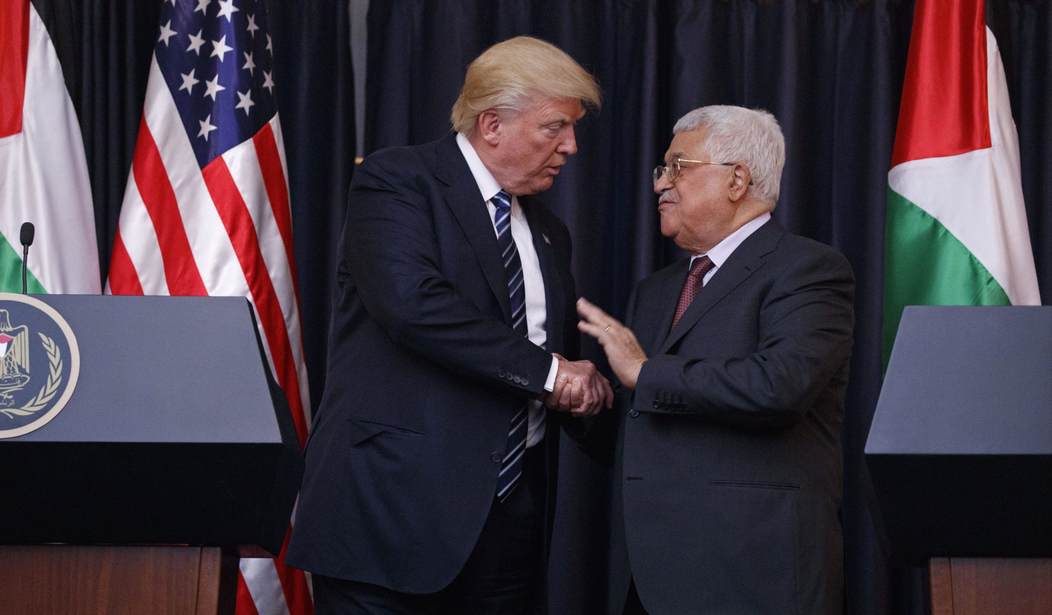WASHINGTON — The Palestinian Authority said President Trump told President Mahmoud Abbas that he intends to move forward with relocating the U.S. Embassy from Tel Aviv to Jerusalem, though they didn’t say when Trump is planning to make the move.
Trump was supposed to decide by Friday whether to move the embassy or issue another six-month waiver. The Jerusalem Embassy Act of 1995 requires that the president move the embassy to Jerusalem, but each president has invoked the law’s national security waiver every six months since.
The Wafa Palestinian News & Info Agency reported today that Trump called Abbas at 3:30 p.m. local time and Abbas warned him “against the grave consequences of moving the U.S. embassy to Jerusalem or making any announcement that alters the long held U.S. policy regarding Jerusalem… on the stability and security of the region and the world at large.”
Wafa said Abbas proceeded to start calling world leaders for support, including Russian President Vladimir Putin and King Mohammed VI of Morocco, to brief them “on the telephone call he received from U.S. President Donald Trump in which he expressed his intention to move the embassy to Jerusalem.”
“He urged world leaders to act quickly to protect Jerusalem and its Muslim and Christian holy places from the danger they will face as a result of such a move,” Wafa reported.
The royal court in Jordan said King Abdullah, who was also on Abbas’ call list, also received a call from Trump, “who indicated his desire to move the United States embassy from Tel Aviv to Jerusalem.”
In the phone call, King Abdullah “warned of pre-empting a comprehensive solution that leads to the establishment of a Palestinian state, with East Jerusalem as its capital.”
“His Majesty emphasized that Jerusalem is key to achieving peace and stability in the region and the world,” the Hashemite Royal Court said in a statement. “The King affirmed that the decision will have serious implications that will undermine efforts to resume the peace process and will provoke Muslims and Christians alike.”
In the call with Abbas, the king was “reaffirming Jordan’s full support for the Palestinians in their efforts to preserve their historical rights in Jerusalem.”
“The King called for working jointly to deal with the ramifications of this decision and to counter any action that undermines the Palestinian people’s aspirations for their own independent state, with East Jerusalem as its capital,” the royal court added.
Turkish President Recep Tayyip Erdoğan called the status of Jerusalem a “red line” for Muslims.
Trump also called Egyptian President Abdel Fattah el-Sisi, according to el-Sisi’s office, and the Egyptian leader told Trump the U.S. should be “maintaining the legal status of Jerusalem within the framework of international rules and relevant UN resolutions.”
El-Sisi urged against “complicating the situation in the region by introducing measures that would undermine chances for peace in the Middle East.”
Trump, who has come under pressure from many lawmakers to fulfill his campaign promise to move the embassy, said in October that he wants to put the peace process with Palestinians first.
Talking to Mike Huckabee on the Trinity Broadcasting Network, Trump said of an Israeli-Palestinian peace process, “I want to give that a shot before I even think about moving the embassy to Jerusalem.”
“If we can make peace between the Palestinians and Israel, I think it’ll lead to ultimately peace in the Middle East, which has to happen,” he said.
Trump promised details of his peace plan, including a decision on the timeframe of an embassy move, “in the not-too-distant future.”
At the beginning of June, Trump announced that he wouldn’t be moving the embassy at the time because forging a peace deal with the Palestinians, who strongly oppose the move, was a priority.
Trump promised during the presidential campaign that he would relocate the U.S. diplomatic facility. “We will move the American embassy to the eternal capital of the Jewish people, Jerusalem,” he told AIPAC in a 2016 address.
After getting into the Oval Office, Trump said he’d study the issue. “I’d love to see that happen,” Trump said at a February press conference alongside Israeli Prime Minister Benjamin Netanyahu. “We’re looking at it very, very strongly. We’re looking at it with great care, great care, believe me. And we’ll see what happens. OK?”
When Palestinian Authority President Mahmoud Abbas visited at the beginning of May, Trump did not answer a question from the press pool about moving the embassy. Trump said he wanted “to support [Abbas] in being the Palestinian leader who signs his name to the final and most important peace agreement that brings safety, stability, prosperity to both peoples and to the region.”








Join the conversation as a VIP Member